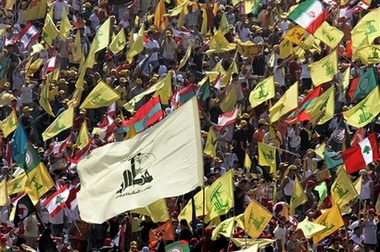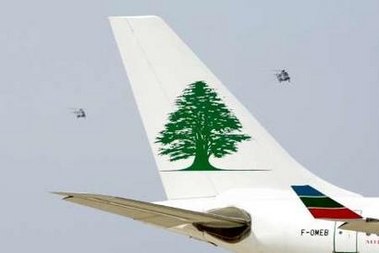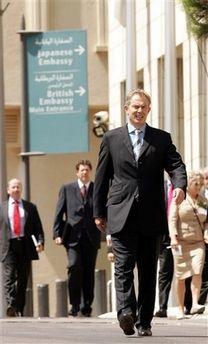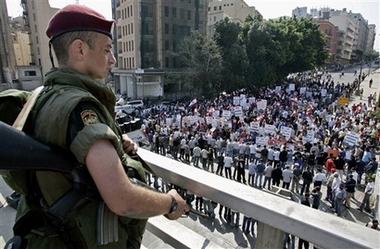 HARISSA, Lebanon (AFP) Sun Sep 24, – Anti-Syrian Christian leader Samir Geagea scoffed at Hezbollah’s claims of victory in its devastating conflict with Israel, during a rally attended by tens of thousands. "We are the victors, and yet we do not feel it was victory but rather that a real catastrophe befell our country, and that our fate and destiny are at the mercy of the winds," said the Lebanese Forces (LF) leader and member of Lebanon’s "March 14" group Sunday.
HARISSA, Lebanon (AFP) Sun Sep 24, – Anti-Syrian Christian leader Samir Geagea scoffed at Hezbollah’s claims of victory in its devastating conflict with Israel, during a rally attended by tens of thousands. "We are the victors, and yet we do not feel it was victory but rather that a real catastrophe befell our country, and that our fate and destiny are at the mercy of the winds," said the Lebanese Forces (LF) leader and member of Lebanon’s "March 14" group Sunday.
Crowds flocked to a hilltop Maronite cathedral in Harissa in the Christian heartland north of Beirut, site of a giant statue of the Virgin Mary, for a mass and to hear Geagea speak at the rally staged as a memorial for "martyrs" of his party members killed during Lebanon’s 1975-1990 civil war.The Christian television network, LBC, close to the LF, said some 90,000 people were expected to flock to the scene, but an independent figure for the turnout was unavailable.
The rally came two days after Syrian-backed Shiite group Hezbollah held a giant demonstration in Beirut to celebrate "victory" in the July-August war with Israel."We are the victors because it was us who were demanding the (Lebanese) army’s deployment (in south Lebanon), backed by UNIFIL (peacekeepers), while they were opposed," said Geagea, without naming Hezbollah.
 BEIRUT, Lebanon -Sept. 22 –
BEIRUT, Lebanon -Sept. 22 –  By Anne Applebaum , Already, angry Palestinian militants have assaulted seven West Bank and Gaza churches, destroying two of them. In Somalia, gunmen shot dead an elderly Italian nun. Radical clerics from Qatar to Qom have called, variously, for a "day of anger" or for worshipers to "hunt down" the pope and his followers. From Turkey to Malaysia, Muslim politicians have condemned the pope and called his apology "insufficient." And all of this because Benedict XVI, speaking at the University of Regensburg, quoted a Byzantine emperor who, more than 600 years ago, called Islam a faith "spread by the sword." We’ve been here before, of course. Similar protests were sparked last winter by cartoon portrayals of Muhammad in the Danish press. Similar apologies resulted, though Benedict’s is more surprising than those of the Danish government. No one, apparently, can remember any pope, not even the media-friendly John Paul II, apologizing for anything in such specific terms: not for the Inquisition, not for the persecution of Galileo and certainly not for a single comment made to an academic audience in an unimportant German city.
By Anne Applebaum , Already, angry Palestinian militants have assaulted seven West Bank and Gaza churches, destroying two of them. In Somalia, gunmen shot dead an elderly Italian nun. Radical clerics from Qatar to Qom have called, variously, for a "day of anger" or for worshipers to "hunt down" the pope and his followers. From Turkey to Malaysia, Muslim politicians have condemned the pope and called his apology "insufficient." And all of this because Benedict XVI, speaking at the University of Regensburg, quoted a Byzantine emperor who, more than 600 years ago, called Islam a faith "spread by the sword." We’ve been here before, of course. Similar protests were sparked last winter by cartoon portrayals of Muhammad in the Danish press. Similar apologies resulted, though Benedict’s is more surprising than those of the Danish government. No one, apparently, can remember any pope, not even the media-friendly John Paul II, apologizing for anything in such specific terms: not for the Inquisition, not for the persecution of Galileo and certainly not for a single comment made to an academic audience in an unimportant German city. ASSOCIATED PRESS, NAIROBI, Kenya
ASSOCIATED PRESS, NAIROBI, Kenya One week before I left for Beirut, my family had dinner with my uncle who was visiting from Beersheva, Israel. Halfway through the evening, he turned to look at me. He put down his fork.
One week before I left for Beirut, my family had dinner with my uncle who was visiting from Beersheva, Israel. Halfway through the evening, he turned to look at me. He put down his fork.  By Jonathan WrightReuters, BEIRUT (Reuters) – Abu Abbas, a car dealer from south Lebanon, has ready answers to the litmus-test question which has traditionally split his country down the middle — whether it should opt out of the Arab-Israeli conflict. Lebanon is an inseparable part of the Arab world, he says, and conflict with Israel is inevitable as long as any Arab land remains under Israeli occupation or Israel even exists.When I see Palestinians in Gaza and the West Bank suffering every day, the victims of racism and destruction, I consider that to be an attack on all humanity," said the 30-year-old bachelor, who supports the Shi’ite Muslim movement Hizbollah.
By Jonathan WrightReuters, BEIRUT (Reuters) – Abu Abbas, a car dealer from south Lebanon, has ready answers to the litmus-test question which has traditionally split his country down the middle — whether it should opt out of the Arab-Israeli conflict. Lebanon is an inseparable part of the Arab world, he says, and conflict with Israel is inevitable as long as any Arab land remains under Israeli occupation or Israel even exists.When I see Palestinians in Gaza and the West Bank suffering every day, the victims of racism and destruction, I consider that to be an attack on all humanity," said the 30-year-old bachelor, who supports the Shi’ite Muslim movement Hizbollah.  By Mark Deen, Sept. 11 (Bloomberg) — Prime Minister Tony Blair drew protesters in Beirut as he met with his Lebanese counterpart Fouad Siniora after refusing to condemn Israel’s bombardment of the country. “Given the events of the past few months, it would be surprising if there weren’t demonstrations,” Blair’s spokesman Tom Kelly said today.
By Mark Deen, Sept. 11 (Bloomberg) — Prime Minister Tony Blair drew protesters in Beirut as he met with his Lebanese counterpart Fouad Siniora after refusing to condemn Israel’s bombardment of the country. “Given the events of the past few months, it would be surprising if there weren’t demonstrations,” Blair’s spokesman Tom Kelly said today.  BIKFAYA, Lebanon By Edward Cody
BIKFAYA, Lebanon By Edward Cody CAIRO (Reuters) – Lebanon said on Wednesday two Israeli soldiers captured by Hizbollah would not be released unless Israel was prepared to discuss a prisoner swap. The unconditional release of the soldiers, whose seizure by the Lebanese Hizbollah guerrilla group in a cross-border raid on July 12 sparked a 34-day war, is called for in the preamble to a UN security council resolution that brought about a ceasefire.
CAIRO (Reuters) – Lebanon said on Wednesday two Israeli soldiers captured by Hizbollah would not be released unless Israel was prepared to discuss a prisoner swap. The unconditional release of the soldiers, whose seizure by the Lebanese Hizbollah guerrilla group in a cross-border raid on July 12 sparked a 34-day war, is called for in the preamble to a UN security council resolution that brought about a ceasefire.